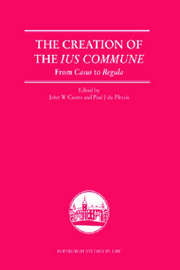Book contents
- Frontmatter
- Contents
- Preface
- List of Contributors
- List of Abbreviations
- Introduction
- 1 The Sources of Medieval Learned Law
- 2 The Infrastructure of the Early Ius Commune: The Formation of Regulae, or its Failure
- 3 Ius Quaerens Intellectum: The Method of the Medieval Civilians
- 4 Medieval Family and Marriage Law: From Actions of Status to Legal Doctrine
- 5 The Roman Concept of Ownership and the Medieval Doctrine of Dominium Utile
- 6 Succession to Fiefs: A Ius Commune Feudorum?
- 7 Towards the Medieval Law of Hypothec
- 8 The Ignorant Seller's Liability for Latent Defects: One Regula or Various Sets of Rules?
- 9 The Glossators' Monetary Law
- 10 Citations and the Construction of Procedural Law in the Ius Commune
- 11 Doctoribus bona dona danda sunt: Actions to Recover Unpaid Legal Fees
- Index
5 - The Roman Concept of Ownership and the Medieval Doctrine of Dominium Utile
Published online by Cambridge University Press: 12 September 2012
- Frontmatter
- Contents
- Preface
- List of Contributors
- List of Abbreviations
- Introduction
- 1 The Sources of Medieval Learned Law
- 2 The Infrastructure of the Early Ius Commune: The Formation of Regulae, or its Failure
- 3 Ius Quaerens Intellectum: The Method of the Medieval Civilians
- 4 Medieval Family and Marriage Law: From Actions of Status to Legal Doctrine
- 5 The Roman Concept of Ownership and the Medieval Doctrine of Dominium Utile
- 6 Succession to Fiefs: A Ius Commune Feudorum?
- 7 Towards the Medieval Law of Hypothec
- 8 The Ignorant Seller's Liability for Latent Defects: One Regula or Various Sets of Rules?
- 9 The Glossators' Monetary Law
- 10 Citations and the Construction of Procedural Law in the Ius Commune
- 11 Doctoribus bona dona danda sunt: Actions to Recover Unpaid Legal Fees
- Index
Summary
BARTOLUS AND HIS DEFINITION OF OWNERSHIP
Commenting on D 41.2.17.1 – a text from the Digest dealing with the difference between possession and ownership (dominium) – the celebrated jurist Bartolus de Saxoferrato gives the following definition of ownership: “What, then, is ownership? Answer: it is the right of complete disposal over a corporeal thing, as long as it is not prohibited by law.” This definition has influenced conceptions of property law for many centuries. It is, for example, repeated almost verbatim in the French Code civil, article 544:
Ownership is the right to enjoy and to dispose of things in the most absolute manner provided they are not used in a way prohibited by statutes or regulations.
The definition of Bartolus is thus apparently not only an adequate expression of the classical Roman law but also a forerunner of the modern, liberal concept of ownership.
The modern continental concept of ownership is that of an absolute right of use and disposal. There can be only one owner (or group of co-owners). The possibility of a vertical division of ownership is excluded. Article 544 of the French Code was drafted as a clear expression of the legislative will to end all feudal institutions. In feudal law, the right of ownership is vertically split between the feudal lord and the tenant: neither has the full right of disposal, because each has to respect the position of the other. Thus, neither lord nor tenant has the right to dispose de la manière la plus absolue (“in the most absolute manner”).
- Type
- Chapter
- Information
- The Creation of the Ius CommuneFrom Casus to Regula, pp. 127 - 142Publisher: Edinburgh University PressPrint publication year: 2010



